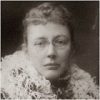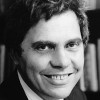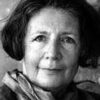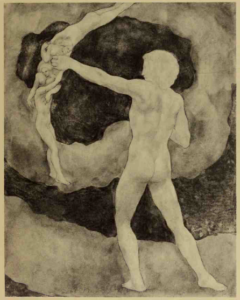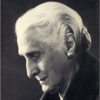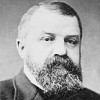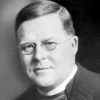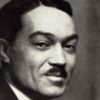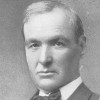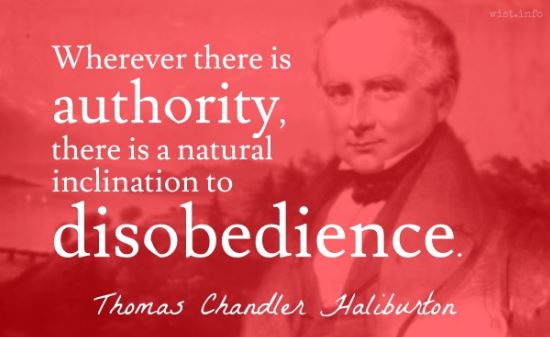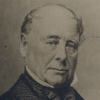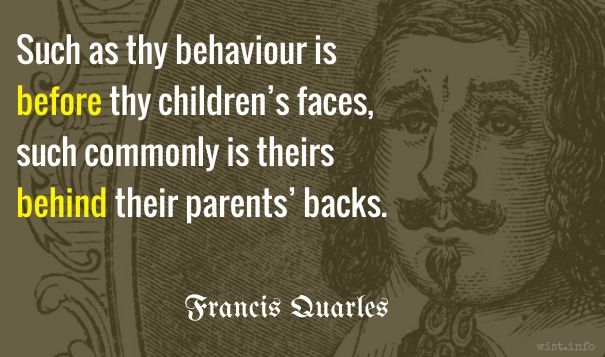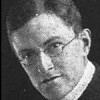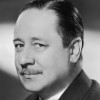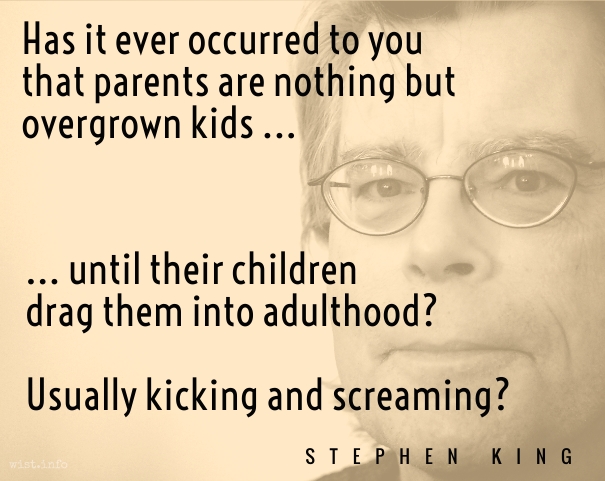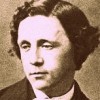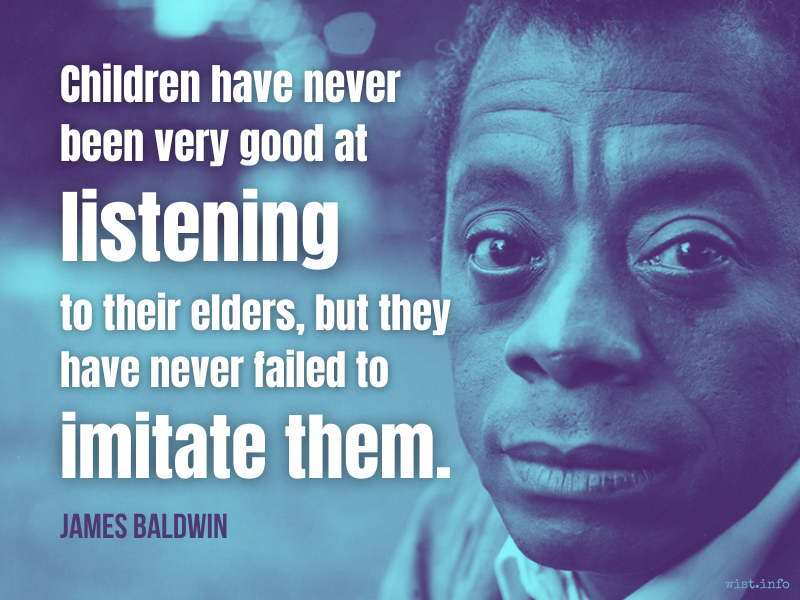Parents of young children should realize that few people, and maybe no one, will find their children as enchanting as they do.
Barbara Walters (1929-2022) American broadcast journalist
How to Talk with Practically Anybody About Practically Anything, ch. 4 (1970)
(Source)
Quotations about:
children
Note not all quotations have been tagged, so Search may find additional quotes on this topic.
Q: Should you tell your mother something if it is important when she is talking to company? I am 6.
A: Yes, you should (after saying “Excuse me”). Here are some of the things that are important to tell your mother, even though she is talking to company:
“Mommy, the kitchen is full of smoke.”
“Daddy’s calling from Tokyo.”
“Jennifer fell out of her crib and I can’t put her back.”
“There’s a policeman at the door and he says he wants to talk to you.”
“I was just reaching for my ball, and the goldfish bowl fell over.”
Now, here are some things that are not important, so they can wait until your mother’s company has gone home:
“Mommy, I’m tired of playing blocks. What shall I do now?”
“The ice-cream truck is coming down the street.”
“Can I give Jennifer the rest of my applesauce?”
“I can’t find my crayons.”Judith Martin (b. 1938) American author, journalist, etiquette expert [a.k.a. Miss Manners]
“Miss Manners,” syndicated column (1981-03-08)
(Source)
A slightly different version was given in Miss Manners’ Guide to Excruciatingly Correct Behavior, Part 3 "Basic Civilization," "Concerning Children" (1983):DEAR MISS MANNERS:
Should you tell your mother something if it is important when she is talking to company? I am six.
GENTLE READER:
Yes, you should (after saying "Excuse me"). Here are some of the things that are important to tell your mother, even though she is talking to company:
"Mommy, the kitchen is full of smoke."
"Daddy's calling from Tokyo."
"Kristen fell out of her crib and I can't put her back."
"There's a policeman at the door and he says he wants to talk to you."
"I was just reaching for my ball, and the goldfish bowl fell over."
Now, here are some things that are not important, so they can wait until your mother's company has gone home:
"Mommy, I'm tired of playing blocks. What do I do now?"
"The ice-cream truck is coming down the street."
"Can I give Kristen the rest of my applesauce?"
"I can't find my crayons."
"When are we going to have lunch? I'm hungry.”
Youth is a wonderful thing. What a crime to waste it on children.
George Bernard Shaw (1856-1950) Irish playwright and critic
(Attributed)
Widely attributed to Shaw (also to Oscar Wilde), but no actual source has been found.
For more discussion of this quotations origin, see Quote Origin: Youth Is Wasted on the Young – Quote Investigator®.
It should be your care, therefore, and mine, to elevate the minds of our children and exalt their courage; to accelerate and animate their industry and activity; to excite in them an habitual contempt of meanness, abhorrence of injustice and inhumanity, and an ambition to excel in every capacity, faculty, and virtue.
John Adams (1735-1826) American lawyer, Founding Father, statesman, US President (1797-1801)
Letter (1775-10-29) to Abigail Adams
(Source)
But there is another form that life can take. We can learn about it from exceptional people of our own culture, and from other cultures less destructive than ours. I am speaking of the life of a man who knows that the world is not given by his fathers, but borrowed from his children; who has undertaken to cherish it and do it no damage, not because he is duty-bound, but because he loves the world and loves his children; whose work serves the earth he lives on and from and with, and is therefore pleasurable and meaningful and unending; whose rewards are not deferred until “retirement,” but arrive daily and seasonally out of the details of the life of his place; whose goal is the continuance of the life of the world, which for a while animates and contains him, and which he knows he can never encompass with his understanding or desire.
Wendell Berry (b. 1934) American farmer, educator, poet, conservationist
The Unforeseen Wilderness: An Essay on Kentucky’s Red River Gorge, ch. 2 “The One-Inch Journey” (1971)
(Source)
In the quotation above is embedded "the world is not given by his fathers, but borrowed from his children," which appears to be the modern origin of a wide array of quotations to that effect.
The chapter was reprinted as "The One-Inch Journey" in Audubon magazine (1971-05).
The basic phrase and variants first achieved popularity in the early 1970s, showing up in a variety of forms (and often attributed to J. J. Audubon himself). Among those variants:Those variants, and more discussion about the origins of this quotation, can be found at: Quote Origin: We Do Not Inherit the Earth from Our Ancestors; We Borrow It from Our Children – Quote Investigator®.
- We have not inherited the land from our fathers, we have borrowed it from our children.
- We have not inherited the earth from our fathers and are hence entitled to use it according to our wishes. We have rather borrowed it from our children ...
- The world is not given by his fathers but borrowed from his children.
- We don’t inherit the earth from our fathers, we borrow it from our children.
- We have not inherited the earth from our fathers, we are borrowing it from our children.
- We have not inherited the earth from our parents, we have borrowed it from our children.
- We have not inherited the land from our parents, we are borrowing it from our children.
- We do not inherit the Earth from our ancestors, we borrow it from our children.
- We did not inherit the earth from our ancestors; we borrowed it from our descendants.
- We did not inherit our future from our ancestors, we have borrowed it from our children..
Note that in the 1991 edition, the passage in question is omitted in the re-edit:But there is another form that life can take. We can learn about it from exceptional people of our own culture, and from other cultures less destructive than ours. I am speaking of the lives of people who have undertaken to cherish the world and do it no damage, not because they are duty-bound, but because they love the world and love their children; whose work serves the earth they live on and from and with, and is therefore pleasurable and meaningful and unending; whose rewards are not deferred until “retirement,” but arrive daily and seasonally out of the details of the life of their place; whose goal is the continuance of the life of the world, which for a while animates and contains them, and which they know they can never encompass with their understanding or desire.
If your children spend most of their time in other people’s houses, you’re lucky; if they all congregate at your house, you’re blessed.
Mignon McLaughlin (1913-1983) American journalist and author
The Second Neurotic’s Notebook, ch. 2 (1966)
(Source)
The ideal home: big enough for you to hear the children, but not very well.
Mignon McLaughlin (1913-1983) American journalist and author
The Second Neurotic’s Notebook, ch. 2 (1966)
(Source)
Your children tell you casually years later what it would have killed you with worry to know at the time.
Mignon McLaughlin (1913-1983) American journalist and author
The Second Neurotic’s Notebook, ch. 2 (1966)
(Source)
Our children know we lie to them, but not — thank God — how much.
Mignon McLaughlin (1913-1983) American journalist and author
The Neurotic’s Notebook, ch. 2 (1963)
(Source)
Nothing is sweeter to children than a mother; love your mother, children, for no where is there a love as sweet as this.
[οὐκ ἔστι μητρὸς οὐδὲν ἥδιον τέκνοις•
ἐρᾶτε μητρός, παῖδες, ὡς οὐκ ἔστ’ ἔρως
τοιοῦτος ἄλλος ὅστις ἡδίων ἐρᾶν.]Euripides (485?-406? BC) Greek tragic dramatist
Erectheus [Ἐρεχθεύς], frag. 358 (TGF) (422 BC)
(Source)
Ironically, Erechthus, as King of Athens, sacrifices one or more of the daughters to ensure the wartime survival of Athens.
Nauck frag. 358, Barnes frag. 35, Musgrave frag. 8. (Source (Greek)). Alternate translations:There's no affection can exceed what children
Feel for their Mother; let this love, my Sons,
Deep in your tender bosoms be implanted:
For no attachments equal kindred ties.
[tr. Wodhull (1809)]Children have nothing sweeter than their mother.
Love your mother children, there is no kind of love anywhere
Sweeter than this one to love.
[tr. @sentantiq (2015)]
Your children are neither as bad nor as good as you imagine. But then, neither are you.
Mignon McLaughlin (1913-1983) American journalist and author
The Neurotic’s Notebook, ch. 2 (1963)
(Source)
At home we read Pinocchio instead. We read Black Beauty, Doctor Dolittle, Little Women, The Adventures of Huckleberry Finn. What I learned about darkness from stories, I learned from books like these — and also from the unedited works of the Brothers Grimm and Hans Christian Andersen.
According to a recent article in the New York Times, few parents expose their children to those works in the original these days, and some of their reasons make sense. Who wants children growing up with the idea that stepmothers are wicked, ugly people are evil, women can get by on their beauty, and princesses are all white? At the same time, I worry about children who grow up thinking that every story has a happy ending and no one gets permanently hurt along the way.Barbara Brown Taylor (b. 1951) American minister, academic, author
Learning to Walk in the Dark, ch. 1 (2014)
(Source)
We start out determined to see that our children are good; we soon settle for having them nice.
Mignon McLaughlin (1913-1983) American journalist and author
The Neurotic’s Notebook, ch. 2 (1963)
(Source)
I would recommend to her and Mr. D. the simple regimen of separate rooms.
Jane Austen (1775-1817) English author
Letter (1817-02-20) to Fanny Austen-Knight
(Source)
On Fanny's aunt, Mrs. Sophia Deedes, having birthed an eighteenth child.
We tell our children things which we know are not so, but which we wish were so.
Mignon McLaughlin (1913-1983) American journalist and author
The Neurotic’s Notebook, ch. 2 (1963)
(Source)
I don’t know whether you have ever seen a map of a person’s mind. Doctors sometimes draw maps of other parts of you, and your own map can become intensely interesting, but catch them trying to draw a map of a child’s mind, which is not only confused, but keeps going round all the time. There are zigzag lines on it, just like your temperature on a card, and these are probably roads in the island, for the Neverland is always more or less an island, with astonishing splashes of colour here and there, and coral reefs and rakish-looking craft in the offing, and savages and lonely lairs, and gnomes who are mostly tailors, and caves through which a river runs, and princes with six elder brothers, and a hut fast going to decay, and one very small old lady with a hooked nose. It would be an easy map if that were all, but there is also first day at school, religion, fathers, the round pond, needle-work, murders, hangings, verbs that take the dative, chocolate pudding day, getting into braces, say ninety-nine, threepence for pulling out your tooth yourself, and so on, and either these are part of the island or they are another map showing through, and it is all rather confusing, especially as nothing will stand still.
Of course the Neverlands vary a good deal. John’s, for instance, had a lagoon with flamingoes flying over it at which John was shooting, while Michael, who was very small, had a flamingo with lagoons flying over it. John lived in a boat turned upside down on the sands, Michael in a wigwam, Wendy in a house of leaves deftly sewn together. John had no friends, Michael had friends at night, Wendy had a pet wolf forsaken by its parents, but on the whole the Neverlands have a family resemblance, and if they stood still in a row you could say of them that they have each other’s nose, and so forth. On these magic shores children at play are for ever beaching their coracles. We too have been there; we can still hear the sound of the surf, though we shall land no more.J. M. Barrie (1860-1937) Scottish novelist and dramatist [James Matthew Barrie]
Peter and Wendy, ch. 1 “Peter Breaks Through” (1911)
(Source)
Not included in the play.
All children, except one, grow up. They soon know that they will grow up, and the way Wendy knew was this. One day when she was two years old she was playing in a garden, and she plucked another flower and ran with it to her mother. I suppose she must have looked rather delightful, for Mrs. Darling put her hand to her heart and cried, “Oh, why can’t you remain like this for ever!” This was all that passed between them on the subject, but henceforth Wendy knew that she must grow up. You always know after you are two. Two is the beginning of the end.
J. M. Barrie (1860-1937) Scottish novelist and dramatist [James Matthew Barrie]
Peter and Wendy, ch. 1 “Peter Breaks Through” (1911)
(Source)
Opening words, not included in the play.
So, confronted with this hoard of stolen riches, the question of who writes or who does not write for children becomes unimportant and, in fact, irrelevant. For every book is a message, and if children happen to receive and like it, they will appropriate it to themselves no matter what the author may say or what label he gives himself. And those who, against all odds and I’m one of them — protest that they do not write for children, cannot help being aware of this fact and are, I assure you, grateful.
P. L. Travers (1899-1996) Australian-British writer [Pamela Lyndon Travers; b. Helen Lyndon Goff]
Essay (1978-07-02), “I Never Wrote for Children,” New York Times
(Source)
HOOK: (communing with his ego) How still the night is; nothing sounds alive. Now is the hour when children in their homes are a-bed; their lips bright-browned with the good-night chocolate, and their tongues drowsily searching for belated crumbs housed insecurely on their shining cheeks. Compare with them the children on this boat about to walk the plank. Split my infinitives, but ’tis my hour of triumph!
J. M. Barrie (1860-1937) Scottish novelist and dramatist [James Matthew Barrie]
Peter Pan, Act 5 (1904, pub. 1928)
(Source)
An analogous scene, but with different internal dialogue, occurs in Barrie's novelization, Peter and Wendy, ch. 14 "The Pirate Ship" (1911).
ORESTES: Ye Gods! There’s no art to tell a decent man,
since generations work haphazardly.
I’ve encountered worthless men, the sons
of noble fathers; good men born from bad;
and I’ve seen hunger in a rich man’s mind,
a poor man’s body housing thoughts sublime.[ὈΡΈΣΤΗΣ: φεῦ:
οὐκ ἔστ᾽ ἀκριβὲς οὐδὲν εἰς εὐανδρίαν:
ἔχουσι γὰρ ταραγμὸν αἱ φύσεις βροτῶν.
ἤδη γὰρ εἶδον ἄνδρα γενναίου πατρὸς
τὸ μηδὲν ὄντα, χρηστά τ᾿ ἐκ κακῶν τέκνα,
λιμόν τ᾿ ἐν ἀνδρὸς πλουσίου φρονήματι,
γνώμην δὲ μεγάλην ἐν πένητι σώματι.]Euripides (485?-406? BC) Greek tragic dramatist
Electra [Ἠλέκτρα], l. 367ff (c. 420 BC) [tr. Wilson (2016)]
(Source)
(Source (Greek)). Alternate translations:There is no certain mark of generous souls:
For in the tempers of mankind prevails
A strange confusion. I have seen the son
Of a great father dwindle into nothing.
And virtuous children spring from wicked Sires;
Among the rich a mean contracted spirit
Have I discover'd, and the poor man's breast
Withi most exalted sentiments inspir'd.
[tr. Wodhull (1809)]Ah! there is no sure mark to recognize a man's worth; for human nature hath in it an element of confusion. For I have seen ere now the son of a noble sire prove himself a worthless knave, and virtuous children sprung from evil parents; likewise dearth in a rich man's spirit, and in a poor man's frame a mighty soul.
[tr. Coleridge (1891)]Alas! there is no sure mark of manliness; for the natures of mortals exhibit a confusion. For already have I seen a man who was naught sprung from a noble sire, and good children [sprung] from bad [fathers[,. and hunger in the spirit of a rich man, and a great mind in a poor body.
[tr. Buckley (1892)]Lo, there is no sure test for manhood’s worth:
For mortal natures are confusion-fraught. --
I have seen ere now a noble father’s son
Proved nothing-worth, seen good sons of ill sires,
Starved leanness in a rich man’s very soul,
And in a poor man’s body a great heart.
[tr. Way (1896)]How dark lies honour hid! And what turmoil
In all things human: sons of mighty men
Fallen to naught, and from ill seed again
Good fruit: yea, famine in the rich man's scroll
Writ deep, and in poor flesh a lordly soul.
[tr. Murray (1905)]Ah! There is no exact way to test a man's worth; for human nature has confusion in it. I have seen before now the son of a noble father worth nothing, and good children from evil parents; famine in a rich man's spirit, and a mighty soul in a poor man's body.
[tr. Coleridge (1938 ed.)]It is impossible to judge a man’s virtue with accuracy. There’s always great confusion in the nature of mortals. I, myself, have seen worthless children born of a virtuous man and from evil parents born brilliant children. I have seen a small, poor mind in a wealthy man and in the soul of a poor man, a great one.
[tr. Theodoridis (2006)]Well, nothing is precise
when it comes to how a man is valued --
men’s natures are confusing. Before this,
I’ve seen a man worth nothing, yet he had
a noble father; I’ve known evil parents
with outstanding children, seen famine
in a rich man’s mind and a great spirit
in a poor man’s body.
[tr. Johnston (2009)]I have known a man of a noble father who turns out
To be nothing while powerful men can rise from the low.
I have seen emptiness in a rich man’s thought
And great judgement in a poor person’s frame.
[tr. @sententiq (2020)]
In its natural state, the child tells the literal truth because it is too naive to think of anything else. Blurting out the complete truth is considered adorable in the young, right smack up to the moment that the child says, “Mommy, is this the fat lady you can’t stand?” At this point, the parent rightly senses the need to explain kindness.
Judith Martin (b. 1938) American author, journalist, etiquette expert [a.k.a. Miss Manners]
Miss Manners’ Guide to Rearing Perfect Children, ch. 8 “Extra Credit,” “Ethics” (1984)
(Source)
“What,” I asked my father once, “what is a concubine?”
“Er‐hum — !” he responded. “Why do you ask?” Clearly, he was playing for time.
“Well, it says in the Bible that David took him more concubines and Solomon had 300.”
He inwardly groaned, but grappled with it. “Well, David was the head of the house, he needed people to look after him and the concubines — er did.”
Three hundred! I thought to myself. One would need a very big house.
“What a pity, father, that you have only two!”
He was astonished. “Two what?”
“Two concubines — Katie and Bella to cook and make beds.”
“Katie and Bella are not my concubines.” Here was a child being childish, which was something he did not like.
“Then, Nelly, what about her?” Nelly was slightly wanting, and came to help with the washing.
“Certainly not.” The idea was repugnant.
“Well, father, who are your concubines?”
“I have no concubines!” he roared and stormed out of the room.
The head of the house and no concubines! Clearly we, as a family, were vastly lower on the social scale than Solomon or David.P. L. Travers (1899-1996) Australian-British writer [Pamela Lyndon Travers; b. Helen Lyndon Goff]
Essay (1978-07-02), “I Never Wrote for Children,” New York Times
(Source)
Whamming someone smaller than oneself in order to teach that person civilized behavior is not within Miss Manners’ concept of propriety, much less logic.
Adorable children are considered to be the general property of the human race. (Rude children belong strictly to their mothers.)
Judith Martin (b. 1938) American author, journalist, etiquette expert [a.k.a. Miss Manners]
Miss Manners’ Guide to Rearing Perfect Children, ch. 2 “The Nursery,” “Crade Courtesy” (1984)
(Source)
Nothing I had written before “Mary Poppins” had anything to do with children, and I have always assumed, when I thought about it at all, that she had come out of the same well of nothingness as the poetry, myth and legend that had absorbed me all my writing life. If I had been told while I was working on the book that I was doing it for children, I think I would have been terrified.
P. L. Travers (1899-1996) Australian-British writer [Pamela Lyndon Travers; b. Helen Lyndon Goff]
Essay (1978-07-02), “I Never Wrote for Children,” New York Times
(Source)
You do not chop off a section of your imaginative substance and make a book specifically for children, for — if you are honest — you have no idea where childhood ends and maturity begins. It is all endless and all one.
P. L. Travers (1899-1996) Australian-British writer [Pamela Lyndon Travers; b. Helen Lyndon Goff]
Essay (1978-07-02), “I Never Wrote for Children,” New York Times
(Source)
Too much of anything is a mistake, as the man said when his wife presented him with four new healthy children in one day. We should practice moderation in all matters.
Jerome K. Jerome (1859-1927) English writer, humorist [Jerome Klapka Jerome]
“Dreams” (1886)
(Source)
Children when they are little make parents fooles, when they are great they make them mad.
George Herbert (1593-1633) Welsh priest, orator, poet.
Jacula Prudentum, or Outlandish Proverbs, Sentences, &c. (compiler), # 939 (1640 ed.)
(Source)
Books that children read but once are of scant service to them; those that have really helped to warm our imaginations and to train our faculties are the few old friends we know so well that they have become a portion of our thinking selves.
The best smell is bread, the best savour, salt, the best love that of children.
George Herbert (1593-1633) Welsh priest, orator, poet.
Jacula Prudentum, or Outlandish Proverbs, Sentences, &c. (compiler), # 7841 (1640 ed.)
(Source)
Do not allow your children to mix drinks. It is unseemly and they use too much vermouth.
Fran Lebowitz (b. 1950) American journalist, essayist
Social Studies, “Parental Guidance” (1981)
(Source)
Parents often talk about the younger generation as if they didn’t have anything to do with it.
So long as little children are allowed to suffer, there is no true love in this world.
Our Founders saw themselves in the light of posterity. We can do no less. Anyone who has ever watched a child’s eyes wander into sleep knows what posterity is. Posterity is the world to come; the world for whom we hold our ideals, from whom we have borrowed our planet, and to whom we bear sacred responsibility.
William Jefferson "Bill" Clinton (b. 1946) American politician, US President (1993-2001)
Speech (1993-01-20), Inaugural Address, Washington, D.C.
(Source)
For little boys are rancorous
When robbed of any myth,
And spiteful and cantankerous
To all their kin and kith.
But little girls can draw conclusions
And profit from their lost illusions.Phyllis McGinley (1905-1978) American author, poet
“What Every Woman Knows,” Times Three (1960)
(Source)
On when kids figure out that Santa Claus is not real.
Parents lend children their experience and a vicarious memory; children endow their parents with a vicarious immortality.
George Santayana (1863-1952) Spanish-American poet and philosopher [Jorge Agustín Nicolás Ruíz de Santayana y Borrás]
The Life of Reason, “Reason in Society,” ch. 2 “The Family” (1905-06)
(Source)
Someday we will regard our children not as creatures to manipulate or to change but rather as messengers from a world we once deeply knew, but which we have long since forgotten, who can reveal to us more about the true secrets of life, and also our own lives, than our parents were ever able to.
Alice Miller (1923-2010) Polish-Swiss psychologist, psychoanalyst, philosopher
For Your Own Good [Am Anfang war Erziehung], “Preface to the American Edition” (1980) [tr. Hannum/Hannum (1983)]
(Source)
May I join you in the doghouse, Rover?
I wish to retire till the party’s over.Ogden Nash (1902-1971) American poet
“Children’s Party,” ll. 1-2, Many Long Years Ago (1945)
(Source)
Children ask better questions than do adults. “May I have a cookie?” “Why is the sky blue?” and “What does a cow say?” are far more likely to elicit a cheerful response than “Where is your manuscript?” “Why haven’t you called?” and “Who’s your lawyer?”
Fran Lebowitz (b. 1950) American journalist, essayist
“Children: Pro or Con,” Metropolitan Life (1978)
(Source)
Even when freshly washed and relieved of all obvious confections, children tend to be sticky.
Fran Lebowitz (b. 1950) American journalist, essayist
“Children: Pro or Con,” Metropolitan Life (1978)
(Source)
Children have an uncanny way of living up — or down — to what is expected of them.
Ann Landers (1918-2002) American advice columnist [pseud. for Eppie Lederer]
“Parenthood: What Do You Owe Your Children?” Family Circle (1977-11)
(Source)
Collected in The Ann Landers Encyclopedia (1978).
Children live in occupied territory. The brave and the foolhardy openly rebel against authority, whether harsh or benign. But most tread warily, outwardly accommodating themselves to alien mores and edicts while living in secret their iconoclastic and subversive lives.
P. D. James (1920-2014) British mystery writer [Phyllis Dorothy James White]
Time To Be in Earnest: A Fragment of Autobiography, “Diary 1997” (1999)
(Source)
You are the bows from which your children as living arrows are sent forth.
The Archer sees the mark upon the path of the infinite, and He bends you with His might that His arrows may go swift and far.
Let your bending in the Archer’s hand be for gladness;
For even as He loves the arrow that flies, so He loves also the bow that is stable.Kahlil Gibran (1883-1931) Lebanese-American poet, writer, painter [Gibran Khalil Gibran]
“On Children,” The Prophet (1923)
(Source)
Anyone who has raised more than one child knows full well that kids turn out the way they turn out — astonishingly, for the most part, and usually quite unlike their siblings, even their twins, raised under the same flawed rooftree.
Children hold us hostage; they represent our commitment to the future.
Barbara Grizzuti Harrison (1934-2002) American journalist, essayist, memoirist
Italian Days, ch. 1 (1989)
(Source)
Graft your pears, Daphnis, now; your children’s children will enjoy the fruit.
[Insere, Daphni, piros: carpent tua poma nepotes.]
Virgil (70-19 BC) Roman poet [b. Publius Vergilius Maro; also Vergil]
Eclogues [Eclogae, Bucolics, Pastorals], No. 9 “Lycidas and Moeris,” l. 50 (9.50) (42-38 BC) [tr. Rieu (1949)]
(Source)
(Source (Latin)). Alternate translations:Daphnis set pears, thy race shall fruit injoy.
[tr. Ogilby (1649)]Under this influence, graft the tender Shoot;
Thy Childrens Children shall enjoy the Fruit.
[tr. Dryden (1709), ll. 68-69]Plant, Daphnis, for the rising race thy pears.
[tr. Wrangham (1830), l. 59]Daphnis, plant thy pear-trees. Posterity shall pluck the fruit of thy plantations.
[tr. Davidson (1854)]Sow, Daphnis, pears, whereof thy sons shall eat.
[tr. Calverley (c. 1871)]Engraft your peartrees, Daphnis; your children's children shall enjoy their fruits.
[tr. Wilkins (1873)]Graft, Daphnis, graft thy trees, nor fear
Thy sons shall all the produce share.
[tr. King (1882), ll. 897-898]You may graft new rows
Of pears; your progeny will shake the boughs.
[tr. Palmer (1883)]Now, the pears;
so shall your children's children pluck their fruit.
[tr. Greenough (1895)]Daphnis, plant your pear-trees. Posterity will pluck the fruit due to your care.
[tr. Bryce (1897)]Engraft thy pear-trees, Daphnis; thy children's children shall pluck their fruit.
[tr. Mackail (1899)]Now, Daphnis, graft
Thy pear trees, that thy children's children may
Eat of their fruit.
[tr. Mackail/Cardew (1908)]Go, Daphnis, graft thy pears!
Sons of thy sons shall gather them in joy.
[tr. Williams (1915)]Graft you pears, Daphnis; your children’s children shall gather the fruits you have sown.
[tr. Fairclough (Loeb) (1916)]Daphnis, engraft thy pears, for thee, thy sons,
And their seed after them.
[tr. Royds (1922)]Daphnis, graft you pears; your children's children
Shall pluck them in peace.
[tr. Johnson (1960)]Daphnis, graft your pears now: your sons’ sons will enjoy them.
[tr. Day Lewis (1963)]Daphnis, plant your pear trees ... years from now
The children of your children will gather the pears ...
[tr. Ferry (1999)]Graft
your pears, Daphnis: your grandchildren will gather their fruit.
[tr. Kline (2001)]
Earthly riches can neither bless us nor our children with happiness; we must either lose them in this life or leave them to be enjoyed after our death by one, we cannot tell whom, perhaps by those we would not should have them.
[Felices enim uel nos uel filios nostros non diuitiae terrenae faciunt aut nobis uiuentibus amittendae aut nobis mortuis a quibus nescimus uel forte a quibus nolumus possidendae.]Augustine of Hippo (354-430) Christian church father, philosopher, saint [b. Aurelius Augustinus]
City of God [De Civitate Dei], Book 5, ch. 18 (5.18) (AD 412-416) [tr. Healey (1610)]
(Source)
(Source (Latin)). Alternate translations:For it is not earthly riches which make us or our sons happy; for they must either be lost by us in our lifetime, or be possessed when we are dead, by whom we know not, or perhaps by whom we would not.
[tr. Dods (1871)]The riches of this earth can make neither us nor our children happy, if they are to be lost while we are alive or, after we are dead, are to pass to people we do not know or, perhaps, dislike.
[tr. Zema/Walsh (1950)]For neither we nor our children are made happy by earthly riches, since they are bound either to be lost while we are living or to be acquired after our death by persons unknown and perhaps unwelcome.
[tr. Green (Loeb) (1963)]Happiness, whether for us or for our children, is not the result of earthly riches, which must either be lost by us in our lifetime or else must pass after our death into the possession of those we do not know or, it may be, of those whom we do not wish to have them.
[tr. Bettenson (1972)]For neither we nor our sons are made happy by earthly riches. These things must either be lost while we are still alive or, after we are dead, acquired by someone whom we do not know, or perhaps by someone whom we would not wish to have them.
[tr. Dyson (1998)]For earthly riches do not make either us or our children happy; they will either be lost while we are still alive or will pass, after our death, to someone we do not know or even to someone we do not want.
[tr. Babcock (2012)]
Children learn what they experience. They are like wet cement. Any word that falls on them makes an impact.
Haim Ginott (1922-1973) Israeli-American school teacher, child psychologist, psychotherapist [b. Haim Ginzburg]
Between Parent and Child: Revised and Updated Edition, ch. 10 “Summing Up” (2003 ed.) [with A. Ginott and H. W. Goddard]
(Source)
Frequently paraphrased (e.g.) as "Children are like wet cement. Whatever falls on them makes an impression."
This is usually cited as being from the original 1965 edition of the book, but cannot be found there. Instead, it appears to be from the 2003 edition, as revised and updated by his wife, Dr Alice Ginott, and Dr H Wallace Goddard. It is unclear if Haim Ginott may have used this phrase in other contexts.
I must study Politicks and War that my sons may have liberty to study Mathematicks and Philosophy. My sons ought to study Mathematicks and Philosophy, Geography, natural History, Naval Architecture, navigation, Commerce and Agriculture, in order to give their Children a right to study Painting, Poetry, Musick, Architecture, Statuary, Tapestry and Porcelaine.
John Adams (1735-1826) American lawyer, Founding Father, statesman, US President (1797-1801)
Letter (1780-05-12 to 15) to Abigail Adams
(Source)
Cleaning your house
While your kids are still growing
Is like shoveling the walk
Before it stops snowing.Phyllis Diller (1917-2012) American comedian, actor, author, musician
Phyllis Diller’s Housekeeping Hints, ch. 1, epigraph (1966)
(Source)
A wise woman once said to me that there are only two lasting bequests we can hope to give our children. One of these she said is roots, the other, wings.
Hodding Carter II (1907-1972) American journalist and author [William Hodding Carter II]
Where Main Street Meets the River, “It’s How We Like It” (1953)
(Source)
Almost always quoted without the notes about the "wise woman," e.g.,There are only two lasting bequests we can hope to give our children: one of these is roots, the other, wings.
Children sweeten labors; but they make misfortunes more bitter.
Francis Bacon (1561-1626) English philosopher, scientist, author, statesman
“Of Parents and Children,” Essays (1625)
(Source)
In a fit of exasperation, Miss Manners once demanded of a six-year-old person how it could be so childish and was forced to admit the justice of its reply, “I’m a child.”
It was nice to hear the voices of little children at play, provided you took care to be far enough away not to hear what they were actually saying.
A Sunday-school is a prison in which children do penance for the evil consciences of their parents.
H. L. Mencken (1880-1956) American writer and journalist [Henry Lewis Mencken]
A Little Book in C Major, ch. 3, § 3 (1916)
(Source)
Variant:SUNDAY SCHOOL. A prison in which children do penance for the evil conscience of their parents.
A Book of Burlesques, "The Jazz Webster" (1924)
Parents are often so busy with the physical rearing of children that they miss the glory of parenthood, just as the grandeur of trees is lost when raking leaves.
Marcelene Cox (1900-1998) American writer, columnist, aphorist
“Ask Any Woman” column, Ladies’ Home Journal (1945-05)
(Source)
A sparkling house is a fine thing if the children aren’t robbed of their luster in keeping it that way.
Marcelene Cox (1900-1998) American writer, columnist, aphorist
“Ask Any Woman” column, Ladies’ Home Journal (1945-11)
(Source)
If you put together all the ingredients that naturally attract children — sex, violence, revenge, spectacle and vigorous noise — what you have is grand opera.
Judith Martin (b. 1938) American author, journalist, etiquette expert [a.k.a. Miss Manners]
Miss Manners’ Guide to Excruciatingly Correct Behavior, Part 9 “Advanced Civilization,” “Play” (1983)
(Source)
Our children await Christmas presents like politicians getting in election returns: there’s the Uncle Fred precinct and the Aunt Ruth district still to come in.
Marcelene Cox (1900-1998) American writer, columnist, aphorist
“Ask Any Woman” column, Ladies’ Home Journal (1950-12)
(Source)
Expect of the young the very best of which they are capable, and you will get it. Expect less, and it is only too likely that you will get no more than you expect.
Bertrand Russell (1872-1970) English mathematician and philosopher
“On National Greatness,” New York American (1932-01-20)
(Source)
Questions about the reproductive system should be answered as naturally as ones about the railroad system.
Marcelene Cox (1900-1998) American writer, columnist, aphorist
“Ask Any Woman” column, Ladies’ Home Journal (1946-02)
(Source)
The thing to remember is that children are temporary. As soon as they develop a sense of humor and get to be good company, maybe even remember to take the trash out and close the refrigerator door, they pack up their electronic equipment and their clothes, and some of your clothes, and leave in a U-Haul, to return only at Thanksgiving. They were just passing through; they were always just passing through on their way to their own lives.
Barbara Holland (1933-2010) American author
One’s Company: Reflections on Living Alone, ch. 4 “Children” (1996)
(Source)
The gifts and the lessons my father left me will last forever: Never take yourself too seriously, never miss a chance to laugh long and hard, speak out about political and social issues you believe in, use the written word as often as you can to make yourself and the world a better place, and love your children with all you’ve got.
Rod Serling (1924-1975) American screenwriter, playwright, television producer, narrator
Paraphrase of Rod Serling in Anne Serling, As I Knew Him: My Dad, Rod Serling, Epilogue (2013)
(Source)
The thousands of possible lives that used to spread out in front of me have snapped shut into one, and all I get is what I’ve got. It’s time to pass on the possibilities, all those deliciously half-open doors, to my children, and drive them to the airports, and wish them bon voyage.
The problem of drugs, of divorce, of race prejudice, of unmarried pregnancy, and so on — as if evil were a problem, something that an be solved, that has an answer, like a problem in fifth grade arithmetic. If you want the answer, you just look in the back of the book. That is escapism, that posing evil as a “problem,” instead of what it is: all the pain and suffering and waste and loss and injustice we will meet our loves long, and must face and cope with over and over and over, and admit, and live with, in order to live human lives at all.
Ursula K. Le Guin (1929-2018) American writer
“The Child and the Shadow,” Quarterly Journal of the Library of Congress (Apr 1975)
(Source)
On the difficulty of "realistic fiction" for children to teach morality. First delivered as a speech; later reprinted in The Language of the Night (1979).
Children are remarkable for their intelligence and ardor, for their curiosity, their intolerance of shams, the clarity and ruthlessness of their vision.
Aldous Huxley (1894-1963) English novelist, essayist and critic
“Vulgarity in Literature” (1930)
(Source)
Little girls are cute and small only to adults. To one another they are not cute. They are life-sized.
Margaret Atwood (b. 1939) Canadian writer, literary critic, environmental activist
Cat’s Eye, ch. 22 (1988)
(Source)
I believe that censorship grows out of fear, and because fear is contagious, some parents are easily swayed. Book banning satisfies their need to feel in control of their children’s lives. This fear is often disguised as moral outrage. They want to believe that if their children don’t read about it, their children won’t know about it. And if they don’t know about it, it won’t happen.
Let children read whatever they want and then talk about it with them. If parents and kids can talk together, we won’t have as much censorship because we won’t have as much fear. The fear that children’s values will change because they are exposed to other values isn’t valid if there is communication between parent and child.
Judy Blume (b. 1938) American writer
“Blume Speaks Out on Speaking Out,” Interview with Barbara Karlin, Los Angeles Times (18 Oct 1981)
(Source)
Fine, Haemon.
That’s how you ought to feel within your heart,
subordinate to your father’s will in every way.
That’s what a man prays for: to produce good sons —
a household full of them, dutiful and attentive,
so they can pay his enemy back with interest
and match the respect their father shows his friend.
But the man who rears a brood of useless children,
what has he brought into the world, I ask you?
Nothing but trouble for himself, and mockery
from his enemies laughing in his face.[οὕτω γάρ, ὦ παῖ, χρὴ διὰ στέρνων ἔχειν,
γνώμης πατρῴας πάντ᾽ ὄπισθεν ἑστάναι.
τούτου γὰρ οὕνεκ᾽ ἄνδρες εὔχονται γονὰς
κατηκόους φύσαντες ἐν δόμοις ἔχειν,
ὡς καὶ τὸν ἐχθρὸν ἀνταμύνωνται κακοῖς
καὶ τὸν φίλον τιμῶσιν ἐξ ἴσου πατρί.
ὅστις δ᾽ ἀνωφέλητα φιτύει τέκνα,
τί τόνδ᾽ ἂν εἴποις ἄλλο πλὴν αὑτῷ πόνους
φῦσαι, πολὺν δὲ τοῖσιν ἐχθροῖσιν γέλων]Sophocles (496-406 BC) Greek tragic playwright
Antigone, l. 639 ff (Act 3) [Creon] (441 BC) [tr. Fagles (1982), l. 712ff]
(Source)
Original Greek. Alt. trans.:Well spoken: so right-minded sons should feel,
In all deferring to a father's will.
For 'tis the hope of parents they may rear
A brood of sons submissive, keen to avenge
Their father's wrongs, and count his friends their own.
But who begets unprofitable sons,
He verily breeds trouble for himself,
And for his foes much laughter.
[tr. Storr (1859)]That, O my son! should be thy constant mind,
In all to bend thee to thy father's will.
Therefore men pray to have around their hearths
Obedient offspring, to requite their foes
With harm, and honour whom their father loves;
But he whose issue proves unprofitable,
Begets what else but sorrow to himself
And store of laughter to his enemies?
[tr. Campbell (1873)]Yes, my son, this is the spirit you should maintain in your heart -- to stand behind your father's will in all things. It is for this that men pray: to sire and raise in their homes children who are obedient, that they may requite their father's enemy with evil and honor his friend, just as their father does. But the man who begets unhelpful children -- what would you say that he has sown except miseries for himself and abundant exultation for his enemies?
[tr. Jebb (1891), l. 640ff]Yea, this, my son, should be thy heart's fixed law, -- in all things to obey thy father's will. 'Tis for this that men pray to see dutiful children grow up around them in their homes, -- that such may requite their father's foe with evil, and honour, as their father doth, his friend. But he who begets unprofitable children -- what shall we say that he hath sown, but troubles for himself, and much triumph for his foes?
[tr. Jebb (1917)]Good. That is the way to behave: subordinate
Everything else, my son, to your father’s will
This is what a man prays for, that he may get
Sons attentive and dutiful in his house,
Each one hating his father’s enemies,
Honoring his father’s friends. But if his sons
Fail him, if they turn out unprofitably,
What has he fathered but trouble for himself
And amusement for the malicious?
[tr. Fitts/Fitzgerald (1939), l. 503ff]Rightly said.
Your father’s will should have your heart’s first place.
Only for this do fathers pray for sons
Obedient, loyal, ready to strike down
Their father’s foes, and love their father’s friends.
To be the father of unprofitable sons
Is to be the father of sorrows, a laughingstock
To all one’s enemies.
[tr. Watling (1947), l. 540ff]And that’s how it should always be, my son! Everything should give way to a father’s wish because that’s why a father hopes to have many children: so that they can inflict upon his enemies whatever hard punishment they can and treat his friends with the same honour as he does. Whereas the father who brings to the world worthless children, well, how would that be different to having brought about the birth of innumerable pains and cause for his enemies to ridicule him?
[tr. Theodoridis (2004)]Indeed, my son,
that’s how your heart should always be resolved,
to stand behind your father’s judgment
on every issue. That’s what men pray for --
obedient children growing up at home
who will pay back their father’s enemies,
evil to them for evil done to him,
while honouring his friends as much as he does.
A man who fathers useless children --
what can one say of him except he’s bred
troubles for himself, and much to laugh at
for those who fight against him?
[tr. Johnston (2005), l. 724ff]There's a good boy. So should you hold at heart
and stand behind your father all the way.
It is for this men pray they may beget
households of dutiful obedient sons,
who share alike in punishing enemies,
and give due honor to their father's friends.
Whoever breeds a child that will not help
what has he sown but trouble for himself,
and for his enemies laughter full and free?
[tr. Wyckoff (1954)]Yes, you should always be disposed this way in your breast, boy,
to assume your post behind your father’s judgments
in all things. For this reason, men pray to beget
and have sons in their households who listen,
that they may both repay an enemy with evils
and honor the philos equally with the father.
Whoever produces useless children,
what could you say about him except that he begets
hardship for himself and great mockery for his enemies.
[tr. Tyrell/Bennett (2002)]
No matter how old a mother is, she watches her middle-aged children for signs of improvement.
Florida Scott-Maxwell (1883-1979) American-British playwright, author, psychologist
The Measure of My Days (1968)
(Source)
Life has a tendency to obfuscate and bewilder,
Such as fating us to spend the first part of our lives being embarrassed by our parents and the last part being embarrassed by our childer.
FIRST …
Let the rockets flash and the cannon thunder,
This child is a marvel, a matchless wonder.
A staggering child, a child astounding,
Dazzling, diaperless, dumbfounding,
Stupendous, miraculous, unsurpassed,
A child to stagger and flabbergast,
Bright as a button, sharp as a thorn,
And the only perfect one ever born.SECOND
Arrived this evening at half-past nine.
Everybody is doing fine.
Is it a boy, or quite the reverse?
You can call in the morning and ask the nurse.
Oh, progeny playing by itself
Is a lonely little elf,
But progeny in roistering batches
Would drive St. Francis from here to Natchez.
Depend upon it, as long as the church is living so much like the world, we cannot expect our children to be brought into the fold.
Dwight Lyman "D. L." Moody (1837-1899) American evangelist and publisher
God’s Good News, “Where Art Thou?” [Gen. 3:9] (1897)
(Source)
Rupert had never forgiven his mother for continuing to have children once she had achieved the heights of human creation by giving birth to Rupert.
Kerry Greenwood (b. 1954) Australian author and lawyer
Death at Victoria Dock, ch. 8 (1992)
(Source)
Children’s talent to endure stems from their ignorance of alternatives.
Maya Angelou (1928-2014) American poet, memoirist, activist [b. Marguerite Ann Johnson]
I Know Why the Caged Bird Sings, ch. 17 (1969)
(Source)
Your responsibility as a parent is not as great as you might imagine. You need not supply the world with the next conqueror of disease or a major movie star. If your child simply grows up to be someone who does not use the word “collectible” as a noun, you can consider yourself an unqualified success.
When one hears the argument that marriage should be indissoluble for the sake of children, one cannot help wondering whether the protagonist is really such a firm friend of childhood.
Listen to the MUSTN’Ts, child,
Listen to the DON’Ts
Listen to the SHOULDN’Ts
The IMPOSSIBLES, the WON’Ts
Listen to the NEVER HAVEs
Then listen close to me —
Anything can happen, child,
ANYTHING can be.
I am always for getting a boy forward in his learning; for that is a sure good. I would let him at first read any English book which happens to engage his attention; because you have done a great deal when you have brought him to have entertainment from a book. He’ll get better books afterwards.
If you bungle raising your children I don’t think whatever else you do well matters very much.
Jacqueline Kennedy Onassis (1929-1994) First Lady of the United States (1961-1963), book editor, celebrity
Interview with Sander Vanocur, NBC News (1 Oct 1960)
(Source)
I never hear parents exclaim impatiently, “Children, you must not make so much noise,” that I do not think how soon the time may come when those parents would give all the world, could they hear once more the ringing laughter which once so disturbed them.
We should note that games are not games for children but are to be judged as the most serious things they do.
[De vray il faut noter, que les jeux des enfants ne sont pas jeux: & les faut juger en eux, comme leurs plus serieuses actions.]
Michel de Montaigne (1533-1592) French essayist
Essays, Book 1, ch. 23 (1.23), “Of Custom and Not Easily Changing an Accepted Law [De la Coustume et de Ne Changer Aisément une Loy Receüe]” (1572) [tr. Screech (1987)]
(Source)
(Source (French)). Alternate translations:For truely it is to bee noted, that Childrens playes are not sports, and should be deemed as their most serious actions.
[tr. Florio (1603), ch. 22]As it must be noted, that the plays of children are not in jest, but must be judged of as their most serious actions.
[tr. Cotton (1686)]Indeed, it is to be noted, that the plays of children are not performed in play, but are to be judged in them as their most serious actions.
[tr. Cotton/Hazlitt (1877), ch. 22]We must take note that the games of children are not games in their eyes; and we must regard these as their most serious actions.
[E.g. (1884)]Indeed, it should be noted that the games of children are not games, and must be judged as their most serious acts.
[tr. Ives (1925), ch. 23]Indeed it must be noted that children’s games are not games, and must be judged in children like their more serious actions.
[tr. Frame (1943), ch. 23]
Children will imitate their fathers in their vices, seldom in their repentance.
Charles Spurgeon (1834-1892) British Baptist preacher, author [Charles Haddon (C.H.) Spurgeon]
Spurgeon’s Sermons, 3rd Series, Sermon 21, “Manasseh” (1883)
(Source)
A torn jacket is soon mended; but hard words bruise the heart of a child.
Your children are not your children.
They are the sons and daughters of Life’s longing for itself.
They come through you but not from you,
And though they are with you yet they belong not to you.
You may give them your love but not your thoughts,
For they have their own thoughts.
You may house their bodies but not their souls,
For their souls dwell in the house of tomorrow, which you cannot visit, not even in your dreams.
You may strive to be like them, but seek not to make them like you.
For life goes not backward nor tarries with yesterday.Kahlil Gibran (1883-1931) Lebanese-American poet, writer, painter [Gibran Khalil Gibran]
“On Children,” The Prophet (1923)
(Source)
There is not so much Comfort in the having of Children as there is Sorrow in parting with them.
Thomas Fuller (1654-1734) English physician, preacher, aphorist, writer
Gnomologia: Adages and Proverbs (compiler), # 4932 (1732)
(Source)
If thou desire to see thy child virtuous, let him not see his father’s vices: thou canst not rebuke that in them, that they behold practiced in thee; till reason be ripe, examples direct more than precepts: such as thy behaviour is before thy children’s faces, such commonly is theirs behind their parents’ backs.
Each second we live is a new and unique moment of the universe, a moment that will never be again. And what do we teach our children in school? We teach them that two and two make four and that Paris is the capital of France. When will we also teach them what they are? We should say to them: Do you know what you are? You are a marvel. You are unique. In all the years that have passed, there has never been another child like you. And look at your body — what a wonder it is! Your legs, your arms, your clever fingers, the ways you move. You may become a Shakespeare, a Michelangelo, a Beethoven. You have the capacity for anything. Yes, you are a marvel. And when you grow up, can you then harm another who is, like you, a marvel? You must work — we must all work — to make the world worthy of its children.
There isn’t a child who hasn’t gone out into the brave new world who eventually doesn’t return to the old homestead carrying a bundle of dirty clothes.
A child miseducated is a child lost.
John F. Kennedy (1917-1963) American politician, author, journalist, US President (1961–63)
State of the Union address (1962-01-11)
This quotation is usually attributed to Kennedy's 1963 State of the Union Address, but it does not show up in the formal text or the video recording.
It actually appears to be from his 1962 State of the Union address; while it does not appear in the text or the audio recording, it does show up in a copy in Vital Speeches and Documents of the Day, Vol. 2 (1961). There are other small textual changes to the speech in that version, which may reflect a press release version before or after the actual speech.
Notoriously insensitive to subtle shifts in mood, children will persist in discussing the color of a recently sighted cement-mixer long after one’s interest in the topic has waned.
Fran Lebowitz (b. 1950) American journalist, essayist
“Children: Pro or Con,” Metropolitan Life (1978)
(Source)
The rules are only barriers to keep children from falling.
[Ces règles ne sont que des barrières pour empêcher les enfants de tomber.]
And why does this same God tell me how to raise my children when he had to drown his?
Robert Green Ingersoll (1833-1899) American lawyer, freethinker, orator
Some Mistakes of Moses, Sec. 18 “Dampness” (1879)
(Source)
Children are different — mentally, physically, spiritually, quantitatively, qualitatively; and furthermore, they’re all a little bit nuts.
[I]t was followed by a long scream of rage mixed with a roar of complaint: “AAaargwannawannaaaagongongonaargggaaaaBLOON!” which is the traditional sound of a very small child learning that with balloons, as with life itself, it is important to know when not to let go of the string. The whole point of balloons is to teach small children this.
Terry Pratchett (1948-2015) English author
Discworld No. 32, A Hat Full of Sky, ch. 11 “Arthur” (2004)
(Source)
This is apparently the origin of the much more frequently found paraphrase:There are times in life when people must know when not to let go. Balloons are designed to teach small children this.
This shorter form has been used, among other places, in a Change.org petition to Death to reinstate Pratchett after the author's passing. It is possible Pratchett may have used it somewhere else, but I am unable to find it (it does not show up in the alt.fan.pratchett board in any message from him).
See also Cox.
Teachers need our active support and encouragement. They are doing one of the most necessary and exacting jobs in the land. They are developing our most precious national resource: our children, our future citizens.
PETER: (baldly) You see, Wendy, when the first baby laughed for the first time, the laugh broke into a thousand pieces and they all went skipping about, and that was the beginning of fairies. And now when every new baby is born its first laugh becomes a fairy. So there ought to be one fairy for every boy or girl.
WENDY (breathlessly). Ought to be? Isn’t there?
PETER. Oh no. Children know such a lot now. Soon they don’t believe in fairies, and every time a child says ‘I don’t believe in fairies’ there is a fairy somewhere that falls down dead. (He skips about heartlessly.)
J. M. Barrie (1860-1937) Scottish novelist and dramatist [James Matthew Barrie]
Peter Pan, Act 1 (1904, pub. 1928)
(Source)
In Barrie's novelization, Peter and Wendy, ch. 3 "Come Away, Come Away!" (1911), this is rendered:“You see, Wendy, when the first baby laughed for the first time, its laugh broke into a thousand pieces, and they all went skipping about, and that was the beginning of fairies.”
Tedious talk this, but being a stay-at-home she liked it.
“And so,” he went on good-naturedly, “there ought to be one fairy for every boy and girl.”
“Ought to be? Isn’t there?”
“No. You see children know such a lot now, they soon don’t believe in fairies, and every time a child says, ‘I don’t believe in fairies,’ there is a fairy somewhere that falls down dead.”
Girls … were allowed to play in the house … and boys were sent outdoors. … Boys ran around in the yard with toy guns going kksshh-kksshh, fighting wars for made-up reasons and arguing about who was dead, while girls stayed inside and played with dolls, creating complex family groups and learning how to solve problems through negotiation and roleplaying. Which gender is better equipped, on the whole, to live an adult life, would you guess?
I think there’s a lot of people out there who say we must not have horror in any form, we must not say scary things to children because it will make them evil and disturbed. … That offends me deeply, because the world is a scary and horrifying place, and everyone’s going to get old and die, if they’re that lucky. To set children up to think that everything is sunshine and roses is doing them a great disservice. Children need horror because there are things they don’t understand. It helps them to codify it if it is mythologized, if it’s put into the context of a story, whether the story has a happy ending or not. If it scares them and shows them a little bit of the dark side of the world that is there and always will be, it’s helping them out when they have to face it as adults.
Joss Whedon (b. 1964) American screenwriter, author, producer [Joseph Hill Whedon]
Interview with Michael Silverberg (NPR)
(Source)
Nothing you do for children is ever wasted. They seem not to notice us, hovering, averting our eyes, and they seldom offer thanks, but what we do for them is never wasted.
Selective ignorance, a cornerstone of child rearing. You don’t put kids under surveillance: it might frighten you. Parents should sit tall in the saddle and look upon their troops with a noble and benevolent and extremely nearsighted gaze.
It’s been my experience that when an office begins to look like a family tree, you’ll find worms tucked away snug and cheerful in most of the apples.
George Horace Lorimer (1867-1937) American journalist, author, magazine editor
Old Gorgon Graham: More Letters from a Self-Made Merchant to His Son, ch. 1 (1903)
(Source)
If children had teachers for judgment and eloquence as they have for languages, if their memory was exercised less than their energy or their natural genius, if instead of deadening their vivacity of mind we tried to elevate the free scope and impulses of their souls, what might not result from a fine disposition? As it is, we forget that courage, or love of truth and glory are the virtues that matter most in youth; and our one endeavor is to subdue our children’s spirits, in order to teach them that dependence and suppleness are the first laws of success in life.
I taught school in the early days of my manhood and I think I know something about mothers. There is a thread of aspiration that runs strong in them. It is the fiber that has formed the most unselfish creatures who inhabit this earth. They want three things only; for their children to be fed, to be healthy, and to make the most of themselves.
The difference between men and boys
Is the price of their toys.Malcolm Forbes (1919-1990) American billionaire
The Sayings of Chairman Malcolm, “Simple Truths” (1978)
Also attributed to Liberace, J. T. Russell, Joyce Brothers, Mark Twain, Doris Rowland, and Dorothy Parker. The phrase can be found in this form in Millard Dale Baughman, Educator's Handbook of Stories, Quotes and Humor (1963), and in 1964 Senate testimony.
For a likely predecessor, see Franklin.
It is useless to try to adjudicate a long-standing animosity by asking who started it or who is the most wrong. The only sufficient answer is to give up the animosity and try forgiveness, to try to love our enemies and to talk to them and (if we pray) to pray for them. If we can’t do any of that, then we must begin again by trying to imagine our enemies’ children who, like our children, are in mortal danger because of enmity that they did not cause.
Wendell Berry (b. 1934) American farmer, educator, poet, conservationist
Essay (2003-02-09), “A Citizen’s Response,” sec. 4, Citizenship Papers (2003)
(Source)
The essay, including this passage, was also published in a longer form in Orion Magazine (2003-03/04), and collected in his Citizenship Papers (2003).
There are families in which the father will say to his child, “You’ll get a thick ear if you do that again,” while the mother, her eyes brimming over with tears, will take the child to her arms and murmur lovingly, “Now, darling, is it kind to Mummy to do that?” And who would maintain that the second method is less tyrannous than the first?
George Orwell (1903-1950) English journalist, essayist, writer [pseud. of Eric Arthur Blair]
Essay (1947-03), “Lear, Tolstoy and the Fool,” Polemic Magazine, No. 7
(Source)
Collected in Inside the Whale, and Other Essays (1962).
There is no absurdity, however palpable, which cannot be firmly implanted in the minds of all, if only one begins to inculcate it before the early age of six by constantly repeating it to them with an air of great solemnity.
[Es giebt keine Absurdität , die so handgreiflich wäre , daß man sie nicht allen Menden fest in den Kopf regen könnte, wenn man nur schon vor ihrem sechsten Jahre anfienge, sie ihnen einzuprägen, indem manunabläffig und mit feierlichstem Ernst sie ihnen vorsagte.]
Arthur Schopenhauer (1788-1860) German philosopher
Parerga and Paralipomena, Vol. 2, ch. 26 “Psychological Observations [Psychologische Bemerkungen],” § 344 (1851) [tr. Payne (1974)]
(Source)
(Source (German)). Alternate translations:There is no absurdity so palpable but that it may be firmly planted in the human head if you only begin to inculcate it before the age of five, by constantly repeating it with an air of great solemnity.
[tr. Saunders (1851)]There is no absurdity, however palpable it may be, which may not be fixed in the minds of all men, if it is inculcated before they are six years old by continual and earnest repetition.
[tr. Dircks(1897)]
Therefore it is fitting for the women to be married at about the age of eighteen and the men at thirty-seven or a little before — for that will give long enough for the union to take place with their bodily vigor at its prime, and for it to arrive with a convenient coincidence of dates at the time when procreation ceases. Moreover the succession of the children to the estates, if their birth duly occurs soon after the parents marry, will take place when they are beginning their prime, and when the parents’ period of vigor has now come to a close, towards the age of seventy.
Aristotle (384-322 BC) Greek philosopher
Politics [Πολιτικά], Book 7, ch. 16 / 1335a.27 [tr. Rackham (1932)]
(Source)
Alt. trans.:And so it is best to unite women of about eighteen years of age and men of thirty-seven or less; for by such an arrangement the union will be during their greatest physical perfection, and will, as the years pass reach the limit of child-begetting at the right time. Again, the succession of children will be secured, as the younger generation will be having children at the beginning of their prime, supposing some to be born at once, as we may expect, and as the right age has passed away from the older generation as they approach the limit of seventy years.
[tr. Bolland (1877)]Women should marry when they are about eighteen years of age, and men at seven and thirty; then they are in the prime of life, and the decline in the powers of both will coincide. Further, the children, if their birth takes place soon, as may reasonably be expected, will succeed in the beginning of their prime, when the fathers are already in the decline of life, and have nearly reached their term of three-score years and ten.
[tr. Jowett (1885)]For which reason the proper time for a woman to marry is eighteen, for a man thirty-seven, a little more or less; for when they marry at that time their bodies are in perfection, and they will also cease to have children at a proper time; and moreover with respect to the succession of the children, if they have them at the time which may reasonably be expected, they will be just arriving into perfection when their parents are sinking down under the load of seventy years.
[tr. Ellis (1912)]Hence it is fitting for women to unite in marriage around the age of eighteen, and for men at thirty-seven or a little before. At such an age, union will occur when their bodies are in their prime, and will arrive at its conclusion conveniently for both of them with respect to the cessation of procreation. Further, the succession of the offspring -- if birth occurs shortly after marriage, as can reasonably be expected -- will be for them at the beginning of their prime, while for the fathers it will be when their age has already run its course toward the seventieth year.
[tr. Lord (1984)]
Croesus said to Cambyses: That peace was better than war; because in peace the sons did bury their fathers, but in wars the fathers did bury their sons.
Francis Bacon (1561-1626) English philosopher, scientist, author, statesman
Apophthegms, #149 (1625)
See Herodotus.
Wise children always choose a mother who was a shocking flirt in her maiden days, and so had several offers before she accepted their fortunate papa.
J. M. Barrie (1860-1937) Scottish novelist and dramatist [James Matthew Barrie]
The Little White Bird, ch. 19 “Joey,” Scribner’s Magazine, Vol. 32 (1902-11)
(Source)
This portion of the serial is in ch. 22 of the fully collected novel (1902).
If being a parent consists often of passing along chunks of ourselves to unwitting — often unwilling — recipients, then books are, for me, one of the simplest and most sure-fire ways of doing that. I would be most content if my children grew up to be the kind of people who think decorating consists mostly of building enough bookshelves.
DREAM: It has always been the prerogative of children and half-wits to point out that the emperor has no clothes. But the half-wit remains a half-wit, and the emperor remains an emperor.
Neil Gaiman (b. 1960) British author, screenwriter, fabulist
Sandman, Book 9. The Kindly Ones, # 60 “The Kindly Ones: 4” (1994-06)
(Source)
It is far more important to love your wife than to love God, and I will tell you why. You cannot help him, but you can help her. You can fill her life with the perfume of perpetual joy. It is far more important that you love your children than that you love Jesus Christ. And why? If he is God you cannot help him, but you can plant a little flower of happiness in every footstep of the child, from the cradle until you die in that child’s arms. Let me tell you to-day it is far more important to build a home than to erect a church. The holiest temple beneath the stars is a home that love has built. And the holiest altar in all the wide world is the fireside around which gather father and mother and the sweet babes.
Sure it’s simple, writing for kids. Just as simple as bringing them up. All you do is take all the sex out, and use little short words, and little dumb ideas, and don’t be too scary and be sure there’s a happy ending. Right? Nothing to it. Write down. Right on. If you do all that you might even write Jonathan Livingstone Seagull and make twenty million dollars and have every adult in America reading your book.
But you won’t have every kid in America reading your book. They will look at it, with their clear, cold, beady little eyes, and they will put it down, and they will go away. Kids will devour vast amounts of garbage (and it is good for them) but they are not like adults; they have not yet learned to eat plastic.
The childless experts on child raising also bring tears of laughter to my eyes when they say, “I love children because they’re so honest.” There is not an agent in the CIA or the KGB who knows how to conceal the theft of food, how to fake being asleep, or how to forge a parent’s signature like a child.
The children now love luxury; they have bad manners, contempt for authority; they show disrespect for elders and love chatter in place of exercise. Children are now tyrants, not the servants of their households. They no longer rise when elders enter the room. They contradict their parents, chatter before company, gobble up dainties at the table, cross their legs, and tyrannize their teachers.
Socrates (c.470-399 BC) Greek philosopher
(Spurious)
Often claimed as a passage from Socrates via Plato, but actually a paraphrase from a synthesis of complaints about youth in antiquity by Kenneth John Freeman, in his 1907 Cambridge dissertation "Schools of Hellas: an Essay on the Practice and Theory of Ancient Greek Education from 600 to 300 BC." See here for more discussion.
We are all born charming, frank, and spontaneous and must be civilized before we are fit to participate in society.
Children have more need of models than of critics.
[Les enfants ont plus besoin de modèles que de critiques.]
Joseph Joubert (1754-1824) French moralist, philosopher, essayist, poet
Pensées [Thoughts], ch. 19 “De l’Éducation [On Education],” ¶ 3 (1850 ed.) [tr. Calvert (1866), ch. 14]
(Source)
Sometimes attributed to Carolyn Coats.
(Source (French)). Alternate translations:Children have more need of models than of critics.
[tr. Attwell (1896), ¶ 261]Children need models rather than critics.
[tr. Lyttelton (1899), ch. 18, ¶ 1]Children. Need models more than critics.
[tr. Auster (1983), 1800 entry]
“Look at me jumping” squeaked Roo, and fell into another mouse-hole.
A. A. Milne (1882-1956) English poet and playwright [Alan Alexander Milne]
Winnie-the-Pooh, ch. 7 “Kanga and Baby Roo Come to the Forest” (1926)
(Source)
Par-runts of rugmonkeys everywhere are worrying that their children will want to become Force-wielding breath masked Sithlords? Sweet Cream-of-Jesus on TOAST POINTS, people!! So now we have to fear that every crib-lizard that loves Anakin Skywalker will become Evil Incarnate. It’s been a lovely planet, but I think I need to go, now.
Children aren’t happy with nothing to ignore,
And that’s what parents were created for.
If there must be trouble, let it be in my day, that my child may have peace.
Thomas Paine (1737-1809) American political philosopher and writer
“The American Crisis” #1 (19 Dec 1776)
Source essay
Children have never been very good at listening to their elders, but they have never failed to imitate them.















